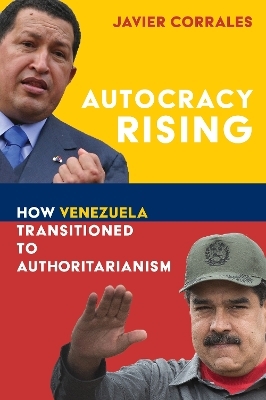
Autocracy Rising
How Venezuela Transitioned to Authoritarianism
Seiten
2023
Brookings Institution (Verlag)
978-0-8157-4007-0 (ISBN)
Brookings Institution (Verlag)
978-0-8157-4007-0 (ISBN)
An alarming number of countries that once were seemingly stable democracies have veered in recent years toward authoritarianism—a trend known as “democratic backsliding.” One of those countries in Venezuela, which enjoyed periods of democratically elected governments in the latter half of the twentieth century but in the past two decades has increasingly descended into autocratic rule, coupled with economic collapse. Autocracy Rising, written by a veteran scholar of Venezuela and Latin American politics generally explores how and why this happened.
Corrales argues that Venezuela’s slide began with the policies of former president Hugo Chávez—policies that were based on government control of the economy and in turn generated a lingering economic crisis. After he succeeded Chávez in 2013, Nicolás Maduro not only entrenched the failed economic policies but also responded to various crises by establishing institutions that further undermined democracy. Each of Maduro’s responses may have solved a short-term problem but collectively they destroyed both any pretense of democracy in Venezuela and prospects for his own long-term success.
Corrales analyzes the lingering crisis in Venezuela by comparing it to twenty cases in Latin America where presidents were forced out of office. Regardless of how the current situation ends in Venezuela, his book illuminates the depressing cycle in which semi-authoritarian regimes become increasingly autocratic in response to crises, only to cause new crises that led to even greater authoritarianism.
Corrales argues that Venezuela’s slide began with the policies of former president Hugo Chávez—policies that were based on government control of the economy and in turn generated a lingering economic crisis. After he succeeded Chávez in 2013, Nicolás Maduro not only entrenched the failed economic policies but also responded to various crises by establishing institutions that further undermined democracy. Each of Maduro’s responses may have solved a short-term problem but collectively they destroyed both any pretense of democracy in Venezuela and prospects for his own long-term success.
Corrales analyzes the lingering crisis in Venezuela by comparing it to twenty cases in Latin America where presidents were forced out of office. Regardless of how the current situation ends in Venezuela, his book illuminates the depressing cycle in which semi-authoritarian regimes become increasingly autocratic in response to crises, only to cause new crises that led to even greater authoritarianism.
Javier Corrales is the John E. Kirkpatrick 1951 Professor of Political Science at Amherst College and the author of Presidents without Parties: The Politics of Economic Reform in Argentina and Venezuela in the 1990s (Penn State Press, 2002).
| Erscheinungsdatum | 01.02.2023 |
|---|---|
| Sprache | englisch |
| Maße | 157 x 237 mm |
| Gewicht | 522 g |
| Themenwelt | Sozialwissenschaften ► Politik / Verwaltung ► Politische Systeme |
| Sozialwissenschaften ► Politik / Verwaltung ► Staat / Verwaltung | |
| Sozialwissenschaften ► Politik / Verwaltung ► Vergleichende Politikwissenschaften | |
| Sozialwissenschaften ► Soziologie ► Spezielle Soziologien | |
| ISBN-10 | 0-8157-4007-7 / 0815740077 |
| ISBN-13 | 978-0-8157-4007-0 / 9780815740070 |
| Zustand | Neuware |
| Informationen gemäß Produktsicherheitsverordnung (GPSR) | |
| Haben Sie eine Frage zum Produkt? |
Mehr entdecken
aus dem Bereich
aus dem Bereich
wie ich versuchte, Italienerin zu werden
Buch | Hardcover (2024)
Droemer (Verlag)
CHF 35,90


